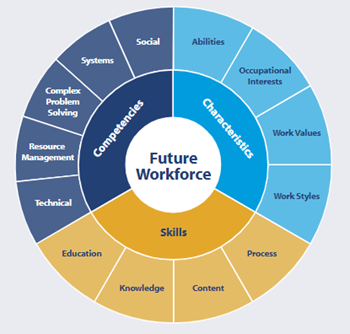Discover the nine Skills for Success
These nine foundational skills are essential for effective learning, career success and community engagement.
- Adaptability – To achieve or adjust goals and behaviours when change occurs, by planning, staying focused, persisting and overcoming setbacks
- Collaboration – To contribute and support others to achieve a common goal
- Communication – To receive, understand, consider, and share information and ideas through speaking, listening and interacting with others
- Creativity and Innovation – To imagine, develop, express, encourage and apply ideas in ways that are new, unexpected or challenge existing methods
- Digital – To use digital technology and tools to find, manage, apply, create and share information and content
- Numeracy – To find, understand, use and report mathematical information presented through words, numbers, symbols and graphics
- Problem Solving – To identify, analyze, propose solutions and make decisions. Problem solving helps employers and employees address issues, monitor success and learn from the experience
- Reading – To find, understand and use information presented through words, symbols and images
- Writing – To share information using written words, symbols and images
For youth interested in the trades, the ITA Essential Skills website can also help them develop their trade skills.
Learn about skills of the future
In addition to the essential skills listed above, employers will be looking for other sets of skills, competencies, and characteristics.
Skills are the ability to perform tasks from knowledge, learning or practice.
Competencies are the ability to perform specific tasks well and to adapt easily to the activities of a variety of jobs. Knowledge and behaviours will lead to success.
Characteristics are qualities that may influence both performance and the capacity to gain the knowledge and skills needed to perform work well.

|
Source: The U.S. Department of Labour/Employment and Training Administration, The O*NET Content Model.
Take inventory of your current skills
Your youth uses a variety of skills everyday as they engage in school, sports and extra-curricular activities. Help them realize how their skills can be applied in the context of work.
Skills are learned and developed with practice. Start the conversation with your youth about what their skills are and how they were attained. Remember, it’s important for your youth to identify their skills in their resume and to demonstrate them during an interview.
Some examples of soft skills are:
- Communication
- Collaboration
- Decision-making
- Adaptability
- Leadership
- Problem-solving
- Organization
- Interpersonal skills
- Teamwork
- Empathy
- Public speaking
- Motivating
- Time management
- Creativity
- Social skills
- Emotional Intelligence
Build, practice and improve your skills
There are many ways to build, practice and improve skills. Encourage your youth to document or journal their experiences.
Here are some examples of opportunities to grow your youth’s skills:
- Part-time work while going to school
- Seasonal work while on summer or winter break
- Gain experience while engaging in interests you are passionate about through committees
- Learn a new sport and build skills working in a team environment
- Experiment and learn a new skill through hobbies
- Take part in extra-curricular activities
- Volunteer and give back to your community
Some other opportunities may be offered in the school environment:
- The Applied Design, Skills and Technologies curriculum: an experiential, hands-on learning program
- Work Experience 12: earn graduation credit while engaging in work-based training opportunities
- Dual-credit opportunities: students earn high school credit while beginning apprenticeships, completing certificates, and working toward professional certifications and diplomas
- Youth Explore Trades Skills: grades 10 to 12, with 25- to 30-hour modules in a range of hands-on, skill-based learning
- Work integrated Learning/Co-operative placement
Get out and volunteer
Volunteering can also provide the opportunity to build skills, as well as supports for the future. This can also help determine whether there is enjoyment working in that role, industry or workplace.
Consider a gap year
Some parents start to worry when they hear their youth is considering a gap year. They fear that if their teen doesn’t keep up the momentum of schooling, they may never return. They may envision that the year is going to be spent playing video games with no plan.
Taking time to listen to your youth’s reasoning behind this decision is worth it. Patience is recommended; it can take a lot of courage for your youth to initiate the conversation of a gap year. It could be for reasons of needing a break from studies or not feeling ready for that next stage in life. They may still not know what they want to pursue for their post-secondary studies. These are all valid reasons.
It is helpful to remember that this is their journey. It's also important to remember, if planned purposefully, a gap year can add a lot of value to a young person’s journey.
Some activities to be considered during a gap year include:
Work – gain experience, try different jobs to find the best fit
Volunteer – give back to the community while gaining experience and contacts
Travel – gain independence, see the world, learn new life experiences and develop greater cultural understanding and sensitivity
Upgrade courses – option to produce better outcomes for post-secondary admissions
There are some excellent gap-year programs and resources available:
Be sure to discuss these ideas with your youth and develop a plan so the year proves to be beneficial.







